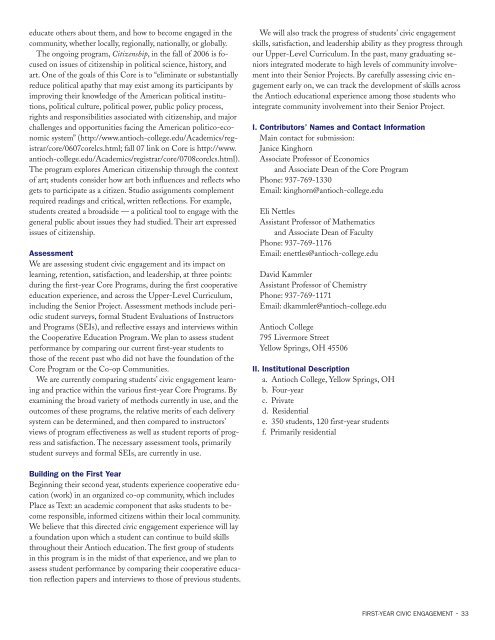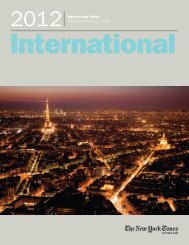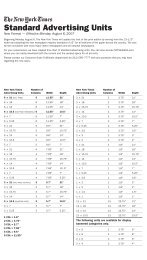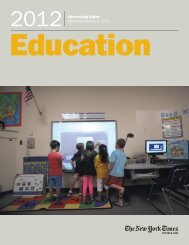CASE STUDYANTIOCH COLLEGE<strong>Civic</strong> <strong>Engagement</strong> in Connected CurriculumJanice Kinghorn, Associate Professor of Economics and Associate Dean of the Core ProgramEli Nettles, Assistant Professor of Mathematics and Associate Dean of FacultyDavid Kammler, Assistant Professor of ChemistryAntioch’s mission shapes its students’ civic engagement:An Antioch education is shaped to the mold of human experience.This is a radically democratic education: every theory, every belief,every ideal is re-examined and subjected to the test of experience. Weask our students to bridge the gap between theory and practice. Theirwork is marked by scholarly rigor — and civic engagement. They cometo know the world by analyzing it — and living deeply within it.They come to know justice by studying it — and practicing it. Theybecome humanists in the broadest, deepest sense of the word: citizensand scholars capable of meaningful action, continuous growth, andenlightened leadership.Connected CurriculaIn 2005, the college undertook an initiative we refer to as our“Connected Curriculum”: a broad and visionary plan to placeAntioch once again at the <strong>for</strong>efront of experimental education.The goals of this renewal included improved retention, increasedcivic engagement and deliberate participation in the community,and more rapid development of meaningful reflective skills. Atthe heart of the Connected Curriculum is a belief in the power ofintegrated learning,Integration in the Connected Curriculum is multifaceted, andit intentionally links academic disciplines, civic engagement, andcooperative education. At every level and during both work andstudy terms, students are expected to be, at some level, in<strong>for</strong>medparticipants who are actively engaged within their communities.Every first-year student enters the Core Program, enrolling ina 15-credit learning community program, taught by four facultyduring the fall and spring terms. These programs immerse studentsthoroughly in the liberal arts, satisfy the general educationrequirements of the college, and provide a structured environmentin which the students learn how to become engaged and effectivecitizens.Following the successful completion of the Core Program, studentsenter the Upper-Level Curriculum: a three-year, year-roundprogram of alternating terms of work (cooperative education) andstudy (16-18 credits of connected and integrated courses) withincreasing per<strong>for</strong>mance standards, which ultimately culminates ina Senior Project in an individualized major.<strong>Civic</strong> <strong>Engagement</strong> in the Classroom:Water Matters and CitizenshipOver the past year, Antioch’s Core Programs have used a varietyof models <strong>for</strong> bringing civic engagement into the classroom andthen reconnecting it to the outside world. This case study willdescribe two of them. The Core Program, Water Matters, used along-term class project to connect classroom learning with civicengagement, while the program Citizenship focuses much classroomlearning directly on issues of civic engagement.Both models seem to be highly effective in teaching our studentsnot only how to be in<strong>for</strong>med about an issue but also how tobecome engaged in various communities around these issues. Additionally,students learned how to educate others about the issuesthey explored.In the spring of 2006, Water Matters, focused on issues of freshwater through the lenses of environmental chemistry, freshwaterecology, literature, and creative writing. This Core examined waterissues around the globe, paying special attention to basic sanitation,potable drinking water, and water use and management.This course had a number of smaller in-house projects coupledwith local and regional field trips designed to connect studentsto community water issues such as nearby stream contamination,severely aging infrastructure, and wetland degradation.The Water Matters term-long civic engagement project culminatedin WaterFest and the inaugural Eric and Kay Johnson GlobalWater Symposium, a two-day seminar on freshwater issues, wellattended by the Antioch community and the general public. Activitiesincluded PowerPoint presentations, poster sessions, and literaturereadings by students and a number of distinguished guests, aswell as distribution of Water Journal, a compilation of student creativeand scientific works from this Core Program. Discussions andpresentations on local, regional, and global fresh water issues wereled by John Huber, the President of the Louisville Water Company,Steve Werner, the Executive Director of Water <strong>for</strong> People (an internationalnon-profit fresh water development organization), andVanessa Tobin, Chief of the Water, Environment, and SanitationProgramme Division of UNICEF.The local field trips and the global symposium taught ourstudents how to become in<strong>for</strong>med on important issues, how to
educate others about them, and how to become engaged in thecommunity, whether locally, regionally, nationally, or globally.The ongoing program, Citizenship, in the fall of 2006 is focusedon issues of citizenship in political science, history, andart. One of the goals of this Core is to “eliminate or substantiallyreduce political apathy that may exist among its participants byimproving their knowledge of the American political institutions,political culture, political power, public policy process,rights and responsibilities associated with citizenship, and majorchallenges and opportunities facing the American politico-economicsystem” (http://www.antioch-college.edu/Academics/registrar/core/0607corelcs.html;fall 07 link on Core is http://www.antioch-college.edu/Academics/registrar/core/0708corelcs.html).The program explores American citizenship through the contextof art; students consider how art both influences and reflects whogets to participate as a citizen. Studio assignments complementrequired readings and critical, written reflections. For example,students created a broadside — a political tool to engage with thegeneral public about issues they had studied. Their art expressedissues of citizenship.AssessmentWe are assessing student civic engagement and its impact onlearning, retention, satisfaction, and leadership, at three points:during the first-year Core Programs, during the first cooperativeeducation experience, and across the Upper-Level Curriculum,including the Senior Project. Assessment methods include periodicstudent surveys, <strong>for</strong>mal Student Evaluations of Instructorsand Programs (SEIs), and reflective essays and interviews withinthe Cooperative Education Program. We plan to assess studentper<strong>for</strong>mance by comparing our current first-year students tothose of the recent past who did not have the foundation of theCore Program or the Co-op Communities.We are currently comparing students’ civic engagement learningand practice within the various first-year Core Programs. Byexamining the broad variety of methods currently in use, and theoutcomes of these programs, the relative merits of each deliverysystem can be determined, and then compared to instructors’views of program effectiveness as well as student reports of progressand satisfaction. The necessary assessment tools, primarilystudent surveys and <strong>for</strong>mal SEIs, are currently in use.We will also track the progress of students’ civic engagementskills, satisfaction, and leadership ability as they progress throughour Upper-Level Curriculum. In the past, many graduating seniorsintegrated moderate to high levels of community involvementinto their Senior Projects. By carefully assessing civic engagementearly on, we can track the development of skills acrossthe Antioch educational experience among those students whointegrate community involvement into their Senior Project.I. Contributors’ Names and Contact In<strong>for</strong>mationMain contact <strong>for</strong> submission:Janice KinghornAssociate Professor of Economicsand Associate Dean of the Core ProgramPhone: 937-769-1330Email: kinghorn@antioch-college.eduEli NettlesAssistant Professor of Mathematicsand Associate Dean of FacultyPhone: 937-769-1176Email: enettles@antioch-college.eduDavid KammlerAssistant Professor of ChemistryPhone: 937-769-1171Email: dkammler@antioch-college.eduAntioch <strong>College</strong>795 Livermore StreetYellow Springs, OH 45506II. Institutional Descriptiona. Antioch <strong>College</strong>, Yellow Springs, OHb. Four-yearc. Privated. Residentiale. 350 students, 120 first-year studentsf. Primarily residentialBuilding on the <strong>First</strong> <strong>Year</strong>Beginning their second year, students experience cooperative education(work) in an organized co-op community, which includesPlace as Text: an academic component that asks students to becomeresponsible, in<strong>for</strong>med citizens within their local community.We believe that this directed civic engagement experience will laya foundation upon which a student can continue to build skillsthroughout their Antioch education. The first group of studentsin this program is in the midst of that experience, and we plan toassess student per<strong>for</strong>mance by comparing their cooperative educationreflection papers and interviews to those of previous students.
- Page 1: First-Year Civic Engagement:Sound F
- Page 5 and 6: CONTENTSivPrefaceMartha J. LaBare,
- Page 7: Zlotkowski, Edward, ed. (2002). Ser
- Page 10 and 11: we had the “great flood” of the
- Page 12 and 13: Requiring civic engagement demonstr
- Page 14 and 15: The preparation of citizens was one
- Page 16 and 17: preparation. At its heart, this wor
- Page 18 and 19: in it of particular interest to tho
- Page 20 and 21: often in tension. Political partici
- Page 22 and 23: educating students for active citiz
- Page 24 and 25: CHAPTER 4Civic Learning: Aligning P
- Page 26 and 27: Faces/Phases of CitizenshipFace/Pha
- Page 28 and 29: ecome more informed and participate
- Page 30 and 31: ReferencesAstin, A.W., Vogelgesang,
- Page 32 and 33: photography techniques to inmates a
- Page 34 and 35: CHAPTER 8Action Steps to Move theFi
- Page 36 and 37: ConclusionI wish to be very clear t
- Page 38 and 39: CASE STUDYALLEGHENY COLLEGECivic En
- Page 42 and 43: CASE STUDYCALIFORNIA STATE UNIVERSI
- Page 44 and 45: CASE STUDYCALIFORNIA STATE UNIVERSI
- Page 46 and 47: CASE STUDYCHANDLER-GILBERT COMMUNIT
- Page 48 and 49: CGCC Global Engagement:http://www.c
- Page 50 and 51: student blog in which students are
- Page 52 and 53: CASE STUDYTHE COLLEGE OF NEW JERSEY
- Page 54 and 55: I. Contributors’ Names and Contac
- Page 56 and 57: opportunities of CSU students and C
- Page 58 and 59: needs, and expectations of the serv
- Page 60 and 61: Although Times Talk began in Septem
- Page 62 and 63: CASE STUDYFRANKLIN PIERCE UNIVERSIT
- Page 64 and 65: We now have a comprehensive assessm
- Page 66 and 67: Another major assignment for this c
- Page 68 and 69: CASE STUDYHAMPDEN-SYDNEY COLLEGELiv
- Page 70 and 71: I. Contributors’ Names and Contac
- Page 72 and 73: Qualitative assessment begins with
- Page 74 and 75: 3. Lessons in Democracy. The IUPUI
- Page 76 and 77: CASE STUDYLEHIGH UNIVERSITYJudging
- Page 78 and 79: CASE STUDYMARS HILL COLLEGELifeWork
- Page 80 and 81: CASE STUDYMERCER UNIVERSITYInterdis
- Page 82 and 83: CASE STUDYMICHIGAN STATE UNIVERSITY
- Page 84 and 85: CASE STUDYPACE UNIVERSITYCivic Enga
- Page 86 and 87: Susan-Feather GannonProfessor, Tech
- Page 88 and 89: AssessmentData were gathered from s
- Page 90 and 91:
CASE STUDYPITZER COLLEGEThe Communi
- Page 92 and 93:
from people different from themselv
- Page 94 and 95:
Table 1Summary of the Major Outcome
- Page 96 and 97:
engaged stewards of the environment
- Page 98 and 99:
HIV-positive individuals. They also
- Page 100 and 101:
Students were then equipped to eval
- Page 102 and 103:
the World Affairs Council (WAC), in
- Page 104 and 105:
CASE STUDYTRINITY UNIVERSITYCivic E
- Page 106 and 107:
I. Contributors’ Names and Contac
- Page 108 and 109:
in the organization of health care
- Page 110 and 111:
study and a series of retreats as p
- Page 112 and 113:
ing based opportunities. Both semes
- Page 114 and 115:
engaging first-year students and st
- Page 116 and 117:
CASE STUDYWEBER STATE UNIVERSITY CO







